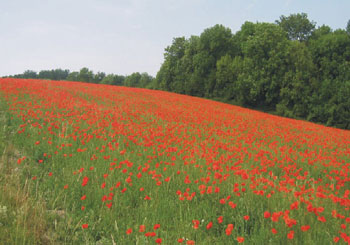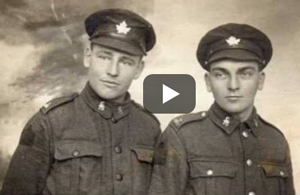World War I Poetry- A Moveable Feast
We try to understand war through memorials, the written word and art among other mediums. In particular, poetry flourished in this war among young soldiers. World War I saw a number of fine poets on the battlefields emerge. Here are sites that discuss these contributions:
1. The Lost Poets
2. Hanover History Dept
3. War Poetry website
4. The Digital archive
5. British War Poetry
The most famous World War I poem is "In Flanders Fields"

In Flanders Fields
"In Flanders fields the poppies blow
Between the crosses, row on row
That mark our place; and in the sky
The larks, still bravely singing, fly
Scarce heard amid the guns below.
"We are the Dead. Short days ago
We lived, felt dawn, saw sunset glow,
Loved and were loved, and now we lie
In Flanders fields.
"Take up our quarrel with the foe:
To you from failing hands we throw
The torch; be yours to hold it high.
If ye break faith with us who die
We shall not sleep, though poppies grow
In Flanders fields."
-John McCrae
McCrae was a Canadian physician and fought on the Western Front in 1914, but was then transferred to the medical corps and assigned to a hospital in France. He was asked to conduct the burial service for Alexis Helmer, a friend, because the chaplain had been called away somewhere else on duty that evening. It is believed that later that evening, after the burial, John began the draft for his now famous poem “In Flanders Fields”.
McCrae died of pneumonia while on active duty in 1918. His volume of poetry, In Flanders Fields and Other Poems, was published in 1919.
The influence of the war poets continued beyond their time.
In 1962, Benjamin Britten wrote his "War Requiem" for the consecration of the rebuilt Coventry Cathedral destroyed in World War II. However, it was dedicated to four friends he lost in World War I. For his text he used 9 poems of World War I poet Wilfred Owen interspersed with the Latin Mass for the Dead. Here is his use of an Owen poem "The Next War" :
"Out there, we’ve walked quite friendly up to Death, —
Sat down and eaten with him, cool and bland, —
Pardoned his spilling mess-tins in our hand.
We’ve sniffed the green thick odour of his breath, —
Our eyes wept, but our courage didn’t writhe.
He’s spat at us with bullets and he’s coughed
Shrapnel. We chorussed when he sang aloft,
We whistled while he shaved us with his scythe.
"Oh, Death was never enemy of ours!
We laughed at him, we leagued with him, old chum.
No soldier’s paid to kick against His powers.
We laughed, — knowing that better men would come,
And greater wars: when each proud fighter brags
He wars on Death, for lives; not men, for flags."
Owen died at just 25.
We are still looking back in this era. In 2009, Mark Knopfler, the former front man for the British Band Dire Straits, released a song called "Remembrance Day". Remembrance Day is the English equivalent of Veterans’ Day.
Here is a part of this moving song:
"Time has slipped away
The summer sky to autumn yields
A haze of smoke across the fields
Let’s sup and fight another round
And walk the stubbled ground
"When November brings
The poppies on remembrance day
When the vicar comes to say
Lest we forget our sons
"We will remember them
Remember them
Remember them"

Check out the video with pictures from the time. Here are the complete lyrics.
